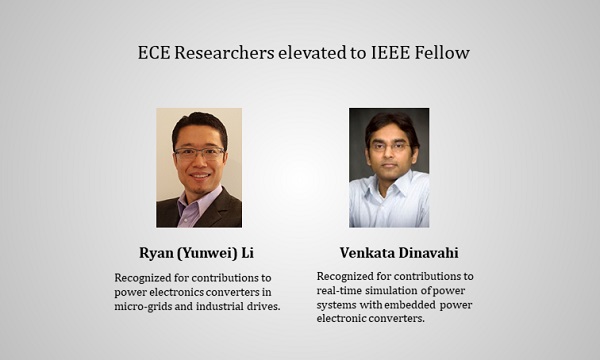
Two Electrical and Computer Engineering Professors, Dr. Ryan (Yunwei) Li and Dr. Venkata Dinavahi, were recently elevated to IEEE Fellows, effective in January 2020.
The IEEE Grade of Fellow is conferred by the IEEE Board of Directors upon a person with an outstanding record of accomplishments in any of the IEEE fields of interest. The total number selected in any one year cannot exceed one-tenth of one-percent of the total voting membership. Fellow is the highest grade of IEEE membership and is recognized by the technical community as a prestigious honour and an important career achievement. The invitation-only membership is offered only to the most influential researchers across the globe.
Dr. Li was recognized for his contributions to power electronics converters in microgrids and industrial drives. While Dr. Dinavahi was recognized for contributions to real-time simulation of power systems with embedded power electronic converters.
Earlier this year, the Web of Science Group also identified Li as one of the world's most influential researchers. He was recognized for his exceptional research influence, demonstrated by the production of multiple, highly-cited papers that rank in the top 1% by citation. Fewer than 0.1%, of researchers across 21 research fields, have earned this exclusive distinction in 2019. In 2017, Li was also awarded $2.5 million from the Canada Foundation for Innovation (CFI) for the construction of the Future Smart Grid Technologies Lab, a unique facility for testing prototype smart grid technologies.
Dinavahi joined the University of Alberta in 2001 and has been a leading researcher in power engineering, especially in the fields of electromagnetic transients, real-time simulation of large-scale power electric and power electronic systems and parallel and distributed computing. Dinavahi leads the Real-Time Experimental (RTX) laboratory, which specializes in experimental research in real-time simulation and control in power and energy systems. This lab was also established with the support of CFI, as well as the Natural Sciences and Engineering Research Council of Canada (NSERC).